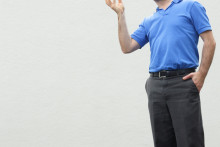Mehmet actually wanted to become a medical doctor, because he ‘liked the white dress’ and wanted to help people. But it appeared to be his destiny to be a doctor in water engineering. ‘My father is the director of the Groundwater Department at the State Water Works in my hometown, so my parents were very proud when I told them about my academic ambitions in this field.’ It seems to be a family thing. ‘My middle brother is the second captain of an oil tanker and my youngest brother is a geophysical engineer, mostly looking for groundwater using seismic tools.’
‘I had one week to make my decision,’ Mehmet explains how he ended up in The Netherlands. ‘I was a research assistant at Istanbul Technical University. I could have eventually become a professor there.’ Instead, Mehmet was offered a position in Twente. ‘I found it a very difficult choice, but was attracted to the topic and the fact that The Netherlands have a long track record in water engineering and management.’ So he gave up his permanent contract.
Unsensational low flows
Mehmet’s study is based on three main pillars: it identifies low flow mechanisms to improve forecast models, it rigorously assesses associated uncertainties in a 10 and 90 day time span, and it evaluates future trends in low flows due to climate change. The model uses information about rain, melting snow and ground water levels to forecast low flows. ‘There have been many efforts on high flood issues as they are more sensational. But low flows are equally important.’
According to Mehmet, the impact is mainly economic. ‘Low flows hamper river navigation, transportation to Rotterdam, and the availability of cooling water for energy supplies. The added value of my work is that it enables an increased forecast lead time from 4 to 10 days and assesses the effect of uncertainty
sources, so that companies and stakeholders can anticipate in a better way.’ The topic is relatively unexplored, which helped Mehmet to publish in high-rank journals. ‘I published in Water Resources Research, an achievement I am proud of.’
Your Dutch is too slow
One could say that Mehmet chose a real Dutch topic, and drowned himself in the Dutch culture accordingly. He joined students for a cycling trip along the Rhine and he wanted to learn the language. The latter wasn’t easy because even a family doctor’s appointment discouraged him. ‘The doctor clarified that I only had ten minutes, so it was best to switch to English.’ Eager to practice anyway, he initiated the Dutch toastmasters at the UT. ‘Once per month, a few foreigners would present in Dutch and a native would correct us.’
As if that wasn’t enough, Mehmet decided to present his dissertation in Dutch, too. ‘I want to express my gratitude to this country and its investment in me. But I also want to represent Turkey, as there are many educated people who are able and willing to integrate.’ Mission accomplished. And Mehmet is off to integrate all over again, since he will start a post-doc position in Portland, USA. Maybe, in a few years, we will find him cruising over the Columbia River, living the American Dream.







